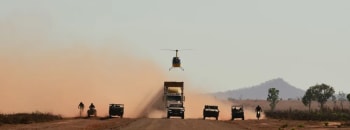Cannes case study: The Stranger
KFTV talks to Thomas M Wright, director of Un Certain Regard crime thriller The Stranger about filming in the ‘Australian badlands’ and coping with darkness
By Chris Evans 27 May 2022

Australian director Thomas M Wright has put himself through the ringer over the last three years working on his second feature film, The Stranger, inspired by the true story of a young boy kidnapped and murdered in Australia in 2003.
Based loosely on Kate Kyriacou’s book The Sting: The undercover operation that caught Daniel Morcombe’s killer, Wright’s film focuses on the duplicitous relationship between an undercover cop, Mark, played by Joel Edgerton, and the suspected killer, Henry (Sean Harris).
“This project and the material really scared me. I wasn’t sure I could go into the level of darkness required,” Wright tells KFTV. “This could’ve been a film or TV series about the family’s grief and search for answers, but I felt I had no right to represent them or the child having learnt a few things.”
Instead, he and Edgerton, who had optioned the rights to the book and serves as a producer through his film collective company Blue-Tongue Films, got to work on a “long and profoundly detailed” research process that took six months.
“I worked 10 hours a day, 7 days a week, talking to people at every corner and level involved in these types of investigations to build up fictionalised composite characters,” he explains. “I then hammered out an initial script in just six days.”
With two Academy award-winning production companies, See Saw (The King’s Speech) and Anonymous Content (Spotlight) also onboard, and after a period of refinement and redrafts, Wright felt ready for the filming process.
Pandemic and filming
Unfortunately, Covid struck, delaying the project by three months. Fortunately, Australia reacted fast in some states, going into lockdown. “This meant we just needed to go into two weeks of quarantine to get to South Australia, which was fantastic for me because I spent that time writing 70 plus pages of all the police documentation that appears in the film. That was authentic to Henry and his case and history. If you go to full screen close-up you’ll see it,” he says.
Once in South Australia amazingly there was no Covid. “We had no social distancing or masks, everything was open,” says Wright. They managed to film 250 scenes across 75 locations in the “Australian badlands” of north Adelaide, which were vital to the mood and story.
“In order to realise the sting operation, the police had to run everything out in these remote spaces because they couldn’t have Henry near the civilian population,” explains Wright. “The landscape also creates a mood. There’s an inside-outside effect - we’re trapped inside the car with Henry and Mark as they build up a false relationship in a claustrophobic environment, while just outside is a harsh, expansive, unforgiving landscape.
“In Australian films there’s a really interesting relationship to landscape and I think that’s because we’re not fully reconciled to it.”
Dark history
Wright is no stranger to dark material. As an actor, he portrayed a haunted ex-con in Jane Campion’s series Top of the Lake, wrote and directed fierce plays for his Black Lung theatre company and examined a twisted relationship in his feature debut, the black comedy Acute Misfortune.
“My first film also dealt with death, but the protagonist was responsible for his own demise, whereas in The Stranger it’s a lot more primal and there are two sides to the characters. Mark has to befriend Henry and put on a front in the hope of trapping him, while knowing what he did, so there’s a lot simmering beneath the surface,” says Wright. “It’s the difficulty of one side of our life imposing on another (Mark is seen looking after his son in the film), which we can all relate to. He’s under a lot of stress and has appalling psychological conflict to deal with. Joel did this brilliantly. I think it’s his best performance.”
While Henry appears naïve, ill and closed at first, as the relationship with Mark develops, we see him open up like pandora’s box. “This is a person who has issues with his own impulses. There’s a violence in his character, which is really intense. Sean did a great job of getting that across.”
The film is built on duality. Two men, two sides to their characters, two sides of the country covered, two parallel sides to the investigation, parallel timelines. “The characters are rarely playing the surface level of what they’re saying in the film,” says Wright. “It’s not a typical procedural crime film, they’re not looking for someone out there.”
Even the idea and concept of ‘the stranger’ is open to interpretation. “It could be the stranger to oneself; someone to be feared - as in the case of Henry (whose identity we never find out); the boy who was murdered or his family; or the investigators responsible for solving the case.”
The final film is exactly what Wright hoped it would be. The reception at the Cannes film festival was positive from the critics and proved “cathartic” for the director (and his team), who jokes “I might attempt a full-on comedy next”.
Rocket Science is handling international sales of the film at the festival.
Latest news & features
Featured profiles
Promote your services with KFTV
Choose from three profile types - Basic, Silver and Gold
Create ProfileWe offer a range of display advertising opportunities.
Learn More


